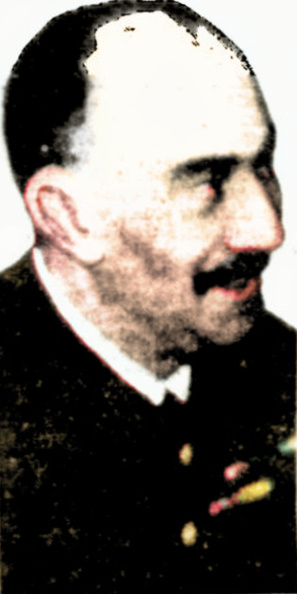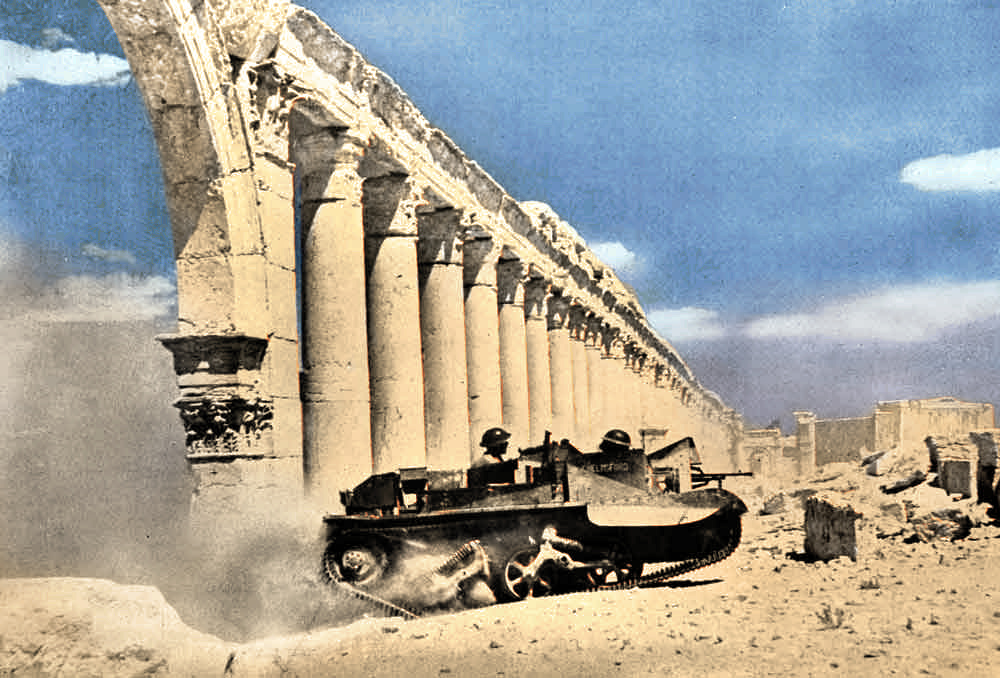The Pittsburgh Press (July 17, 1941)
BRITISH TAKE OVER SYRIA WITH LITTLE FANFARE
By Henry T. Gorrell, United Press staff writer
Beirut, Lebanon, July 16 – (delayed)
General Henry Maitland Wilson, British commander for Palestine, and General Georges Catroux, Free French leader, tried to be as ostentatious as possible in taking over the administration of Syria and Lebanon from the Vichy French today.
But local civil functionaries, religious dignitaries and awesome foreign diplomats greeted them almost as conquering heroes.
Two Axis officials, the Japanese and Romanian consuls, attended the reception for Generals Wilson and Catroux in the palace council chamber of General Henri Dentz, the Vichy leader whose forces were defeated by the British and Free French.
The people of Beirut were disappointed by the lack of fanfare in the entry of the main body of British troops.
General Wilson, General Catroux and their military aides drove to Grand Sarail Palace in six camouflaged American autos and quickly reviewed an honor guard in the courtyard.
Admiral Gouton, representing the Vichy government, made a brief speech in turning over the city to the Allied forces.
Red-fezzed civil functionaries went to the palace to witness the ceremony but the Australian military police, unable to understand their rapid-fire French, pushed them back. They got in only after an interpreter told the slouch-hatted Aussies who they were.
Corneliu Van H. Engert, United States consul-general, attended the ceremony in striped trousers and swallowtail coat.
The Pittsburgh Press (July 18, 1941)
INSIDE STORY OF WAR IN SYRIA REVEALS THAT VICHY WARSHIPS FIRED INTO AIR
…
Reporter explains slowness of British advance; anger against French Beirut commander forced him to shift residence nightly
…
By Harold Peters, United Press staff writer
Beirut, Lebanon, July 17 – (delayed)
Great Britain and the Free French won a strange war in Syria and Lebanon.
It is possible now to tell the inside story as I saw and heard it here at the general headquarters of the Vichy French during the weeks the British Imperial and Free French troops were moving slowly to victory.
Vichy warships fired their shells into the air instead of at the British fleet. General Henri Dentz, the Vichy commander-in-chief, changed his residence each night because of popular feeling against him all during the war. Free French agents were active in Vichy territory.

Gen. Henri Dentz. Vichy chief moved often.
Army of only 45,000
Reliable figures, disclosed by Free French agents who remained here during the campaign, were that the Vichy forces totaled about 45,000 men, of whom only half saw action. Of these, 10,000 were Syrians and Lebanese, 15,000 African colonials, 5,000 Foreign Legionnaires and 15,000 real Frenchmen.
Casualties of the Vichy forces are estimated at about 2,000 killed and 2,000 to 3,000 seriously wounded.
It seemed clear that at the start of the campaign, the Germans intended to aid the Vichy forces against their former allies. At least two German planes fought with them and during the first week German artillery officers arrived here by airplane.
One pilot killed
The pilot of one of these German planes parachutes to earth, wounded, 1¼ miles from my house in a mountain village. His co-pilot was killed.
During the first week, I satisfied myself of the arrival of German artillery officers. Four unmistakable German officers were billeted at a hotel at which I then stayed.
After the first week or so, however, German participation in the campaign was confined to a civilian commission which included a half dozen Italians. At one time, the German commission numbered 28. It dwindled to two key agents who remained until two weeks ago. The German infiltration began in February when 20 commissioners were joined by technicians and experts who brought the total number of German agents to about 150.
Carried foreign passports
Most of the Germans were reported to carry Bulgarian and Romanian passports. They were permitted to use military telephones and gasoline, strictly rationed for others, was given to them freely.
The ebb and flow of German and Italian agents was an accurate barometer of front line action. All the Germans and Italians left Beirut for Aleppo, up toward the Turkish frontier, when Damascus fell to the British and Free French. They returned when Vichy resistance tiffened.
Many Vichy officers were disheartened, believing that Germans were in control in Syria, and a captain remarked:
We are fighting for the King of Prussia.
This belief was strengthened by the attempts General Dentz made to strengthen Vichy resistance.
When French non-commissioned officers, leading their men in the fighting, were thinned out, General Dentz tried to replace them. Fifteen airplanes flew in a shuttle service between Tunis, on the French African coast, and Aleppo. The planes flew by way of Athens. It was uncertain whether some German artillery experts were brought in also, but British Imperial officers, who had fought in Greece, told me that at two points there was a sudden improvement in French artillery firing and the technique was similar to that of the Germans.
General Dentz tried to hearten his troops by announcing that the 35,000-ton battleship Jean Bart and the 26,500-ton battleship Dunkerque were on the way from Toulon with reinforcements and ammunition.
Fired into the air
It is asserted that the three destroyers which made up the French “fleet” here fired shells into the air in an attempt to hearten the people. It would be interesting to find out, in fact, whether the British fleet actually encountered any French warships.
The destruction of the transport St. Didier by British warships off the Turkish coast ended attempts to bring reinforcements by sea.
Gen. Dentz’s last attempt at stiffening resistance was when they rejected the British demand that he declare Beirut an open city.
The city became almost depopulated when Free French agents made known his declaration:
I will follow orders even if it means fighting in the streets.
Anti-aircraft batteries were posted near hospitals, including that of the American University.
General Dentz’;s refusal to remove military targets such as munitions, supply dumps and military garages, caused most of the people who had remained to flee too.
Villagers around Beirut were angered when General Dentz placed artillery batteries in or near the villages. One battery was placed next door to the home of the Greek Orthodox Archbishop on Mt. Lebanon. The British declined to fire on it, and the Archbishop’s home was undamaged.
Forbearance by the British in this and other instances undoubtedly slowed their advance. During the last weeks of the campaign, only about 1,000 Vichy troops were able to hold the strong defensive positions south of Beirut.

